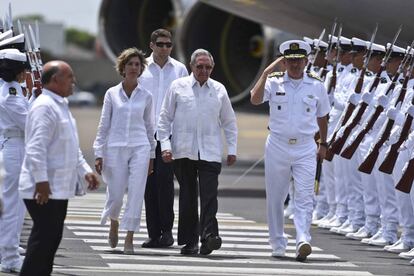Can Colombia’s peace deal secure support in upcoming referendum?
Accord reached between government and FARC will be signed today, but still has to pass test of the people


After four years of peace negotiations, on Monday Colombia’s President Juan Manuel Santos will sign an accord and then shake hands with Rodrigo Londoño, the leader of the Revolutionary Armed Forces of Colombia (FARC), ending half-a-century of conflict with the leftist guerrilla force. Present at the ceremony in the Caribbean resort of Cartagena de Indias will be 13 heads of state, some 30 foreign ministers, and more than 2,500 dignitaries.
But while the leaders of the two sides are in agreement about ushering in a new era of peace, the conflict in this South American country will not truly be over until the Colombian people validate the accords in a referendum that will take place on October 2, in a week’s time.
The government and the FARC hope the ceremony will boost support in the referendum
Opinion polls currently suggest that the electorate will vote Yes and approve the peace deal. But given that in recent weeks the polls have swung in both directions, and given the their fallibility in the case of the UK’s Brexit vote, an air of uncertainty hangs over the plebiscite as voting day approaches.
When the referendum was called, most people rejected a deal with the FARC; but when the peace accords with the guerillas was announced at the end of August after talks in Havana under the auspices of the Cuban government, support shifted significantly, with some polls putting the Yes camp 30 points ahead of its opponents. Over the last week, that lead has slowly eroded: the latest poll, by Opinómetro de Datexco, shows 55.3% in favor, with 38% against and 4.3% still undecided.
Despite the nervousness within the government and the FARC, some on the respective negotiating teams argue that media coverage of the narrowing gap between supporters and opponents of the deal will mobilize the still undecided to see the importance of a formal deal to end decades of violence and for the FARC to join mainstream politics. Voter turnout in Colombia is generally low, which has raised the specter of a stalemate whereby the Yes vote wins narrowly but without reaching the required figure of 4.5 million voters.
Colombians must now validate the accords in a referendum on October 2
The government and the FARC will be hoping that Monday’s signing ceremony will boost support for a Yes in the referendum in the final stage of the campaign. In any event, there will be nothing like it in the coming seven days. Heads of state and representatives of international institutions have been arriving over the weekend, while the FARC team, which is staying about an hour from Cartagena, plans to meet with many of the guests away from the limelight.
The FARC arrived from its conference held in the southeast of the country. Ostensibly, the event was to discuss the accords, but having invited more than 1,000 journalists from around the world, the guerrilla movement was keen to present its best side, organizing concerts and other activities. The government was happy at this approach, with media coverage of the event, dubbed Colombia’s Woodstock by some pundits, putting the peace deal in a good light.
English version by Nick Lyne.
Tu suscripción se está usando en otro dispositivo
¿Quieres añadir otro usuario a tu suscripción?
Si continúas leyendo en este dispositivo, no se podrá leer en el otro.
FlechaTu suscripción se está usando en otro dispositivo y solo puedes acceder a EL PAÍS desde un dispositivo a la vez.
Si quieres compartir tu cuenta, cambia tu suscripción a la modalidad Premium, así podrás añadir otro usuario. Cada uno accederá con su propia cuenta de email, lo que os permitirá personalizar vuestra experiencia en EL PAÍS.
¿Tienes una suscripción de empresa? Accede aquí para contratar más cuentas.
En el caso de no saber quién está usando tu cuenta, te recomendamos cambiar tu contraseña aquí.
Si decides continuar compartiendo tu cuenta, este mensaje se mostrará en tu dispositivo y en el de la otra persona que está usando tu cuenta de forma indefinida, afectando a tu experiencia de lectura. Puedes consultar aquí los términos y condiciones de la suscripción digital.








































